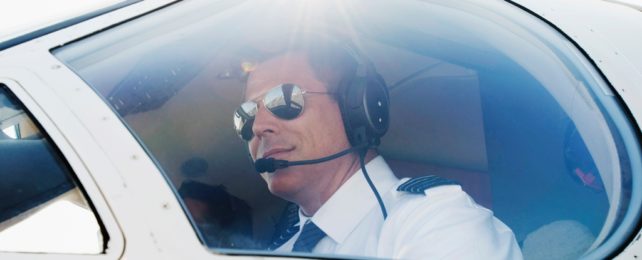Emotional intelligence is a powerful tool, helping us navigate not just our own complex emotional worlds, but also those of our friends, family, co-workers, and strangers.
It's vital in a wide range of professions, especially fields with frequent or intensive social interaction like education, health care, or the service industry.
But what if your job mostly involves interacting with an emotionless machine?
If you're a pilot, for example, you may need excellent concentration, memory, and situational awareness, among other traits. But how much emotional intelligence do you need to fly an airplane?
Despite a wealth of research on emotional intelligence overall, few studies have looked at its role in aviation, according to a team of researchers led by Major Zachary Dugger, an instructor in the Department of Mathematical Sciences at United States Military Academy West Point.
In hopes of shedding light on the issue, Dugger and his colleagues contacted pilots from "numerous aviation organizations" around the US, ultimately recruiting 44 volunteers to take a questionnaire designed to assess emotional intelligence.
Emotional intelligence refers to the ability to identify and regulate your own emotions, as well as to recognize emotions in other people and empathize with them. The term was popularized by an eponymous book in the 1990s, and has drawn growing research interest ever since.
There are two main models for measuring emotional intelligence (EI): trait EI and ability EI. The new study focuses on trait EI, which the authors define as "a constellation of emotional perceptions assessed through questionnaires and rating scales".
Many studies have already examined trait EI in various contexts, the authors note, and it has been "strongly linked to behaviors that constitute key components of the pilot skillset, including leadership, mental toughness, and stress management".
Yet very little research has directly examined trait EI among pilots, they add.
The researchers cite two studies that have tackled the topic, but while those papers found trait EI is positively linked with pilots' training performance and "safety citizenship behaviors", both were limited to military pilots, and neither compared pilots' EI with that of the general public.
And since research suggests other personality traits influence a pilot's success – like extraversion and neuroticism, for example – Dugger and his colleagues suspect emotional intelligence plays an undervalued role worth investigating.
The 44 pilots who volunteered for the study varied in age from 24 to 67 years, with flight experience ranging from 150 to over 5,000 hours. They included both fixed-wing and rotary-wing pilots, but all were required to hold a currently valid flight qualification.
For a control group, the study used 88 non-pilots from a US dataset of people who took the TEIQue questionnaire.
The researchers matched subjects on age, gender, ethnicity, and education, letting them control for factors that have been shown to affect trait EI.
The pilots also took the TEIQue, which measures trait EI by asking subjects to read 153 statements and rate their agreement with each. It covers the four major factors in trait EI – well-being, emotionality, sociability, and self-control – plus 15 more specific facets.
Pilots scored "consistently lower than their matched counterparts" in overall trait EI, the researchers write, as well as in well-being, emotionality, and sociability. The study found no significant differences in self-control scores between pilots and non-pilots.
The reasons for these differences remain unclear, but the study's authors have some ideas.
The factors of well-being, emotionality, and sociability are related to "a positive assessment of one's emotional capabilities," they write, and when taken too far, that initially beneficial self-assessment sometimes "veers into narcissism and hubris."
Pilots need to be "careful, straightforward, and understated in their work", the researchers note, which could breed a different mindset compared with jobs that incentivize more self-promotion. That might explain comparably low scores among military managers, they add.
At the same time, pilots also belong to an organizational culture that often rewards an impression of invulnerability and "resistance to human weakness", they add.
"Pilots have long been associated with a masculine culture that emphasizes aggressiveness, competition, and performance orientation," the researchers write.
"In practice, the pilot selection and training process may produce pilots, primarily male but also female, who fit within this culture."
The new study does have some noteworthy limitations. The sample size of 44 pilots is small, for example, and lacks diversity: The majority of pilots who participated are male (93 percent), white (91 percent), and have completed at least some college (98 percent).
Also, most of the pilots either currently serve or previously served as military aircrew members, undercutting this study's ability to go beyond the military-centric focus of previous studies.
Still, this research marks an important step in filling the void of information about emotional intelligence in pilots, the researchers contend.
"Although exploratory, these findings highlight promising avenues for future trait EI research within the broader sector of international aviation," they write.
More research like this could help improve pilot training and organizational culture, they add, producing pilots who are better prepared for aviation duty and "ultimately leading to improved safety, performance, and all-around satisfaction".
The study was published in Scientific Reports.
